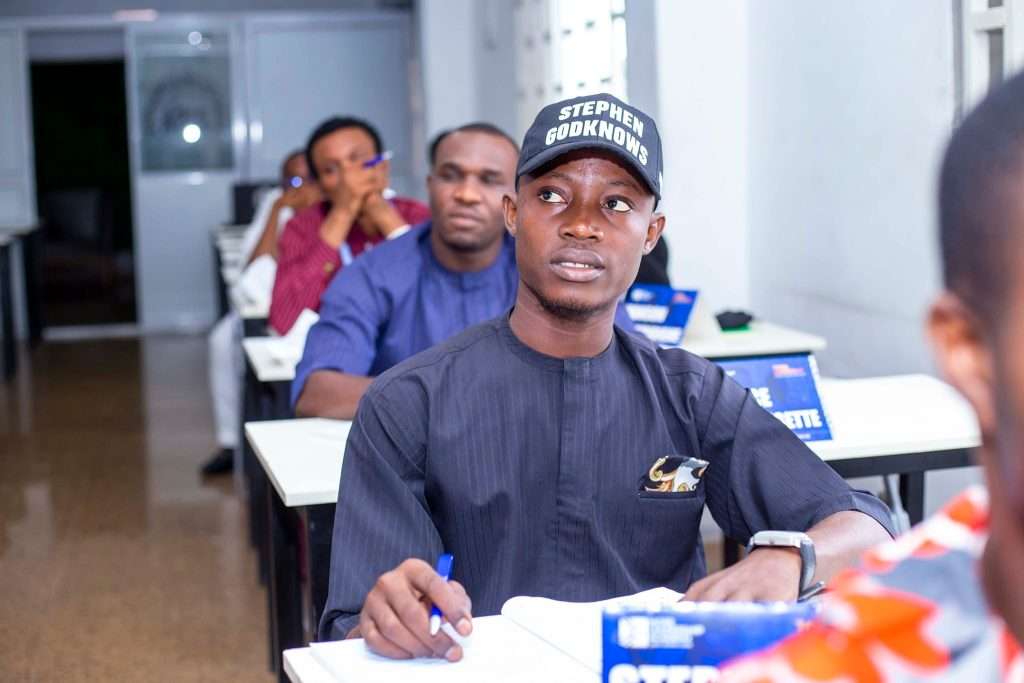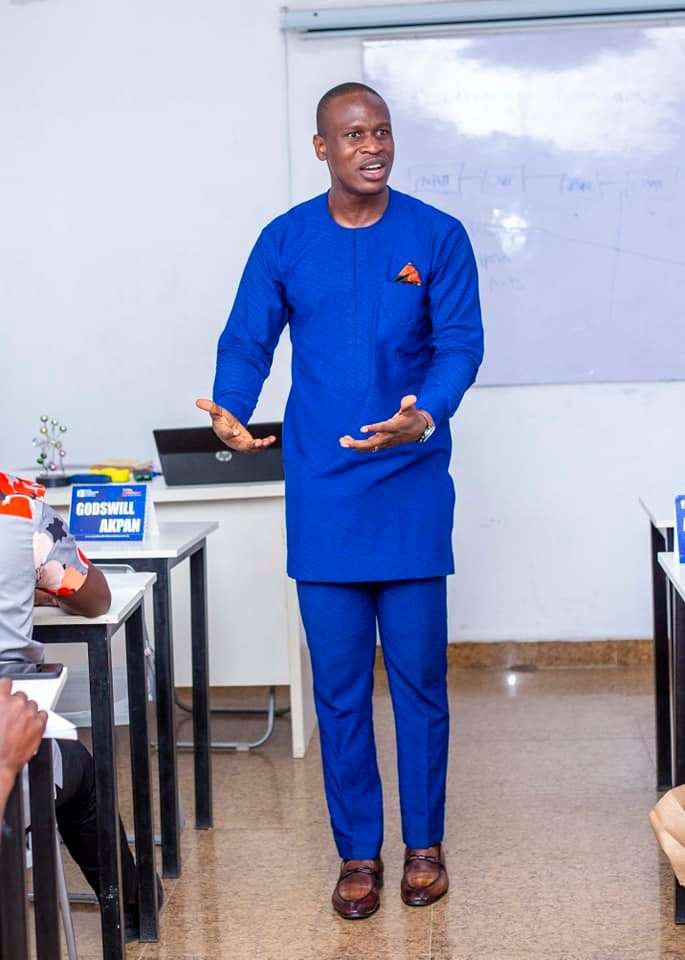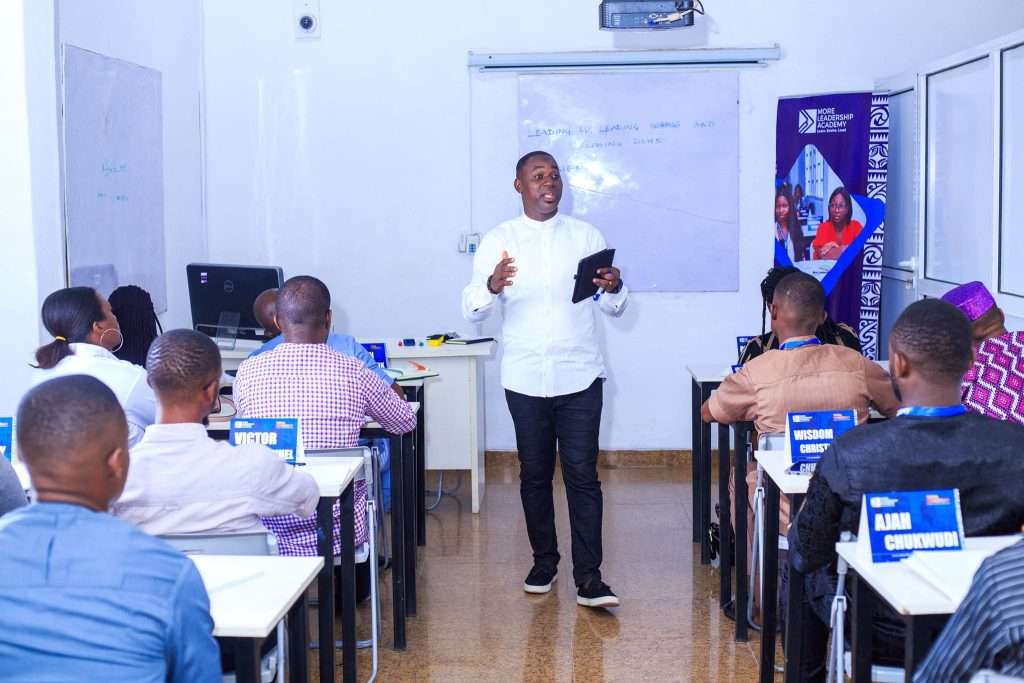Barister Morgan Ekanem is the Chancellor of More Leadership Academy, a need-driven institution with the aim of building young leaders to answer the leadership questions in Africa.
In this interview with Emen Usen, Bar. Morgan Ekanem shares the idea behind the More Leadership Academy and how the academy intends to answer the leadership question in Africa.
Motivation Africa: Can you give us a little background about the More Leadership Academy?

Barr. Morgan Ekanem: The More Leadership Academy is a need-driven institution that teaches and builds young leaders for leadership positions in the future. We know that one of the main issues in our country and in Africa is leadership. Therefore, the academy aims to offer solutions to these problems.
A lot of people seem to have agreed on the fact that Africa is blessed naturally in terms of resources, but what is making us remain where we are in terms of developmental traction is the absence of quality leadership.
Over the years, what we realized is that most people only know the problem, but beyond knowing the problem, they do nothing to ensure that these problems are solved.
The more leadership academy agrees first that we have a leadership problem in Africa, but beyond agreeing that we have a problem, we now ask ourselves, ‘What can we do to ensure that this problem doesn’t continue?”
So we come up with the idea of an institution where young leaders are groomed and built for tomorrow.
We are interested in young leaders, so if we are able to build them with the right leadership mentality and mindset, they can fill the void of quality leadership in the future.
Motivation Africa: As a mentor to many aspiring leaders all over Akwa Ibom and its horizon, what is your leadership story?
Barr. Morgan Ekanem: Well, my leadership story will begin with, to put it in context, self-leadership. I came from a family where my father was a perfectionist; he was well-known for his academic prowess. In terms of mental ability and academic pursuit, my father took first place almost all his life, so being born in that kind of house and being like him physically, I had this kind of appeal to want to be like him mentally, to always want to win where he won.
But beyond that is the fact that my father, whereas he took first position in most of his academic pursuits, ended up as a school principal. I’m not saying that’s a negative thing per se. But we weren’t too proud of it because he had contemporary who weren’t too sound like him but ended up as professors, justices of the Court of Appeal, etc.
My father was a tailor, but he sponsored himself to become a school principal. I believe if he had more privileges, he would have been more.
Because of that, I came up as a child and said, “My father ended up as a school principal with all his intellect and my mother ended up as headmistress,” so I used to tell myself that I was going to become a Vice Chancellor, because it seemed like there was this kind of academic thing in the family, so I said, “If he got to the peak of his career as a school principal, I have to be more than what he was, because I had someone paying my fees.” That was the kind of foundation that I started from, “the need to do more than my father,” which took the subject of self-leadership, which was me trying to discipline myself to do everything I needed to do, to be better than my father.
While in school, I worked so hard to become the best-graduating student during my time in the faculty of law at the University of Uyo. And still it wasn’t enough; I kept pushing, because I always had this picture of my father as a standard that didn’t need fulfillment, so my life in that aspect has been that of a child who wanted to do more than the father.
But against that background of self-leadership, I think I got attention a bit early in life; I studied at Holy Family College, Abak, and I was the Sanitary Prefect. Being a Sanitary Prefect, there is a lot of attention on you, so If you have a lot of attention on you, what do you do? This leads me to the subject of self-branding.
Motivation Africa: What inspired you to start a Leadership Academy? Is there any significance to the word ‘’More’’?

Barr. Morgan Ekanem: The World is changing; each day new things unfold, except for the leadership problem in Nigeria and Africa as a whole. There are people who tell me they want to become me; they want to act like me, talk like me, and so on. It was my love of teaching young people that inspired me to set up an academy where young leaders can learn, network, and connect.
The name “MORE” didn’t come as a result of my background story. The name was inspired by the Spanish national motto “Non plus ultra“, meaning nothing further beyond. This is because people thought Spain was the end point of the world, but as more research was carried out, other cities were discovered, so to this effect, they had to change their national motto to Plus Ultra, which means “further beyond.” The name holds a significant meaning; it pushes us to go beyond our comfort zones, to stretch, and to fill our curiosity.
Motivation Africa: What do you believe are the most important qualities of a successful leader and how do you cultivate those qualities in your students?
Barr Morgan Ekanem: I like to situate my answers within the context of a question that was once asked: “Who is a leader that people love to follow?” Or what qualities does a leader who people love to follow possess?
The first of those qualities was that the leader should have courage—courage to take initiative, courage to dream, and courage to venture into areas that others are afraid of. Because before most people begin to follow you, they must have seen you go in a direction that inspires them.
John Maxwell would say a leader is someone who knows the way, goes the way, and shows the way. If you come to show the way alone, you won’t be a leader because the question will be, “What is your track record in this area?” It will take courage to go the way others have not gone; it will take courage to find out and know, then return and show others.
Beyond courage, a leader should have a genuine interest in people. Leadership is principally a people affair; you are not leading things; you are leading people. If you don’t have a genuine interest in people, you will end up using people, not things.

One of the leadership problems we have in our contemporary time is that we have leaders who have vision but don’t have the interests of people at heart – Morgan Ekanem
The next quality I will mention is discipline and integrity. I have to combine the two because disciple is about self-leadership, while integrity is about relationship with people. Leadership begins with yourself, if you have not successfully led yourself, you cannot lead people. This brought us to the question of character, personality, and reputation. Reputation is what people will eventually see, while character is a function of self-discipline.
Another quality is effective communication. I added effective because communication is one thing, but being effective at it is another. Communication goes beyond talk and instruction. In leadership communication; communication include the tone, mood, and culture of the organization.
Motivation Africa: How do you stay current with the latest trends and best practices in leadership development?
Barr Morgan Ekanem:
Nobody is busy with what he or she is interested in. If you are in a relationship and you are interested in that relationship, you will always find time to grow that relationship – Morgan Ekanem

One of the habits a leader should have is the desire to learn. You have to learn; you have to be up-to-date. One of the things I say to myself is that people are following me; people are looking up to me. What will happen the day I have nothing to share? So I try to ensure that I am always up-to-date because I have people who look up to me.
One of the programs I came up with because of the need to stay on top of the trend was More Leadership Academy Reading Leader’s Corner, which we do every Sunday.
So every month we read one leadership book, and there is a live interview session every Sunday. Because I am going to interview someone during the live interview, I have to discipline myself to read the book so that I will be able to flow during the live interview program.
That goes on to show that if you have interest in something, you will make time for it, but beyond having interest and making time for it, you may need to strategically wire your life in a way that will help you get what you want.
Motivation Africa: How do you balance teaching the theory of leadership with practical and hands-on experience?

Barr Morgan Ekanem: What we teach is based on experience. The truth is that there is no dichotomy between theory and practice. Theory is supposed to explain practice in an ideal setting. Personally, what I teach is what I have seen; for every theory I have ever taught, I will list at least four experiences that endorse those theories. We teach, for instance, self-leadership, and I have told you how I personally led myself, so the students get to know this.
We teach, for instance, emotional intelligence, and we say it involves self-awareness, self-regulation, and all that. For instance, self-awareness in emotional intelligence means you should know yourself and know what works and doesn’t work for you. Self-regulation beyond that focuses on, since you know yourself and what works for you, how do you control them for your growth and benefit?
At the More Leadership Academy, we have what we call a review class every Thursday for students to share practical experience and learn during the process.
Motivation Africa: Can you describe any challenges or setbacks you have faced while running the academy and how you overcame them?
Barr Morgan Ekanem: The first challenge in setting up a leadership academy is having a reputation that can run an institution. If you want to start a leadership academy, the first question people will ask will be, “Where is the fruit of leadership in your life that you want to teach?”
So the question was, Was Morgan fit to talk about leadership?
The next challenge was separating the personality (me) from the academy. At some point, the institution needs to run with or without you. For instance, who is the owner of Harvard? Who is the owner of Lagos Business School? People go to those places not because of the owner; they go to those places because there is a system and a proven record of results and standards.

Harvard is Harvard because those who have passed through it have become… past presidents, governors, captains of industries, etc. – Morgan Ekanem
So because of the high rise of their alumni, it gives traction back to the school. The challenge we are facing is pushing our people toward becoming.
The other challenge is getting other facilitators that have the passion, but beyond passion, have the skills to inspire the next generation of leaders. Finances is another major challenge. If you look at our expenses at this initial stage, you will know that we are not running a business; we are running a passion.
The last challenge is the receptivity challenge. For instance, if you write a proposal for the More Leadership Academy and you approach a bank like Zenith Bank, and Zenith Bank asks you who are the members of the board of directors, and they see Morgan Ekanem and David as directors, the reality is that there may be this doubt: can this young ‘boy’ deliver what we want?
We are still trying to build the brand element that will give that prestige, but it requires a lot of money—more money than the students we are building can afford.
Because, the demographic we are interested in is not exactly the demographic that can fund the standard we are looking at. The More Leadership Academy is interested in young leaders, students, people who are struggling, and people who are still dependent on their parents, because if we can get it right at this stage, Africa will be better.
Motivation Africa: What plans does the Academy have in the next five years for emerging leaders?

Barr Morgan Ekanem: In 5 years, we should have been 7 years old. I believe we would start having people in leadership positions who are alumni of the school. We are hoping to have systems in place, currently there is this high dependence on my personal brand to run the academy, but we are hoping that in the next 5 years there will be a total separation between the Morgan brand and the More Leadership Academy, so that the academy can run with or without Morgan.
Another important thing is the structure, we should be able to have structures of our own because we are currently using a shared facility. Once we have a structure of our own, there are so many things we will put in place so that we can run many courses concurrently.
Also, we are working on getting more facilitators with different skills, experience and certification. Finally, the issue of certification is very important, we are currently working on getting credible affiliations to boost our certifications.
Motivation Africa: How can leaders prepare their teams for change and help them adapt to new circumstances?
Barr Morgan Ekanem: The first way to prepare a team for change is for leaders to model what they want to see. We should ask ourselves deep questions; how many of our leaders are willing to model honesty, integrity and accountability?
Apart from that, we encourage leaders to be authentic, be real, and accept that they are not superhuman. It’s important for leaders to understand their area of competence and seek collaboration where necessary.
Collaboration is very important. Africa was known to be a collaborative community, which is why we have the Ubuntu philosophy, which simply means ‘I am because you are.”
As civilization came, there seemed to be division, and it went down to even personal relationships, so we don’t have that collaborative idea or synergy in leadership in Africa any more.
We are preaching the message of collaboration, and one of the things we ask leaders to do is build credible vision, meaning they should build for tomorrow, not just today. We encourage leaders to raise other leaders, not just to amass followers.
Motivation Africa: In your experience, what are some common pitfalls that leaders fall into when leading through change, and how can they overcome them?
Barr Morgan Ekanem: It is one thing to want to lead through change, and it is another thing to be able to even understand what the change holds. So some people are very courageous but ignorantly courageous, so they just say they want to do it, so they move.
So the question is, when you say you want to lead through change, do you understand the change that is coming?
The second part is building capacity for the change. You can ask yourself this question, now, that I understand the change that is coming, what do I need to do? Some people are aware of change, but they are not skill-wise ready for it, so the change may get them unawares
The last part is making plans, engaging with your team and implementation.
Motivation Africa: What advice would you give to aspiring leaders who want to develop their skills in leading through change?
Bar Morgan Ekanem: The advice I would give to aspiring leaders is to grow themselves, expand their knowledge and become more.


This is inspiring. Morgan is a Leader
Thank you so much